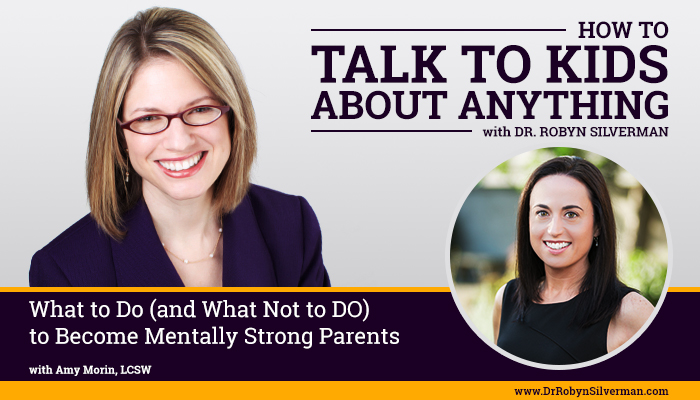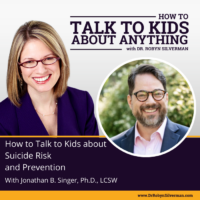Podcast: Play in new window | Download
Subscribe: Apple Podcasts | RSS | More
How to Talk about the 13 Things Mentally Strong Women and Girls Don’t Do

This podcast will focus on the negative habits women and girls need to be aware of so that they can own their power, channel their confidence and find their authentic voice. How can women and girls stop blaming themselves, comparing themselves, downplaying their success, seeing vulnerability as a weakness and more so that they can reach their potential without apologizing for it? Given the cultural landscape and the societal pressures that women and girls put on themselves, now is the perfect time to redefine themselves and sharpen their mental strength. Dr. Robyn Silverman interviews international best-selling author, Amy Morin, for the third time on How to Talk to Kids about Anything, about her new book, 13 Things Mentally Strong Women Don’t Do.
In the wake of the very public emergence of the #MeToo, #TimesUp and #girlstoo movements, the latter that we discussed with our Girls Inc Team, Lara Kaufmann and Dr. Christina Spears, a few weeks back– women and girls have encouraged to find their voice,  claim their power, come out of the shadows and not back down. But with a history of messages that tell women and girls that they need to be perfect, they shouldn’t break the rules, they should be quiet and look pretty, take a backseat and downplay their own success to avoid making others feel uncomfortable or be seen as “full of herself,” it’s a challenge for many to reinvent what it means to be a woman in 2019. It takes mental strength. We must build mental muscle and get out of our own way if we are going to change along with these important empowerment movements. How does mental strength in women make a difference? What areas, specifically, should we work on? And how does embracing and practicing mental strength as women translate to encouraging mental strength in the girls we love, teach and guide? For these questions and more, we will be interviewing the fabulous Amy Morin, for the 3rd time in the history of the show.
claim their power, come out of the shadows and not back down. But with a history of messages that tell women and girls that they need to be perfect, they shouldn’t break the rules, they should be quiet and look pretty, take a backseat and downplay their own success to avoid making others feel uncomfortable or be seen as “full of herself,” it’s a challenge for many to reinvent what it means to be a woman in 2019. It takes mental strength. We must build mental muscle and get out of our own way if we are going to change along with these important empowerment movements. How does mental strength in women make a difference? What areas, specifically, should we work on? And how does embracing and practicing mental strength as women translate to encouraging mental strength in the girls we love, teach and guide? For these questions and more, we will be interviewing the fabulous Amy Morin, for the 3rd time in the history of the show.
Amy Morin is a licensed clinical social worker, college psychology instructor, and psychotherapist. She is the author of the bestseller 13 Things Mentally Strong People Don’t Do, as well as 13 Things Mentally Strong Parents Don’t Do. Amy serves as Verywell‘s Parenting Teens Expert and Child Discipline Expert, and is a regular contributor to Forbes, Inc., and Psychology Today. She is the only person in the psychology industry who is talking about mental strength on a global level. She was named the “self-help guru of the moment” by The Guardian. She lives in Marathon, Florida. Big news: Amy’s new book, 13 Things Mentally Strong Women Don’t Do, is out this week!
The podcast provides:
- The meaning of mental strength and why we need to talk about mental strength and women
- Key take-aways women at different stages should keep in mind as they build mental strength and avoid sabotaging themselves.

- What mentally strong women don’t do when facing dangers or potential dangers—especially given #metoo and #timesup and now #girlstoo (see our podcast with GirlsInc in 2018)?
- Helpful behaviors and not so helpful behaviors around women and making comparisons.
- The cost of seeing vulnerability as a weakness- and what we should do instead.
- How we can help our girls, ourselves and then women in our lives to ensure that self doubt doesn’t get in the way of our goals.
- How well-meaning families and teachers can limit our abilities to dream big and what we should do it those negative voices are strong in our ears/brains
- How blaming ourselves is different from being accountable/
- Helpful strategies to change your old story and take responsibility for yourself without going into a spiral of blame and shame.
Important Messages:
- Mental Strength has to do with how we think, feel and behave. We must learn how to think realistically/productive, you can cope with uncomfortable feelings and you can change your feelings as well, and knowing how to take positive action even when things aren’t going very well.
- How can you be feminine and strong at the same time?
- Cultural situations play in to how girls and women see themselves. How can we help our girls become the strongest and best versions of themselves? How can we show a mentally strong example?
- There are many habits that we engage in as women—we need to break those habits.
- Boys get freedom to break the rules. But girls should not. We are making progress but we still have a ways to go.
- Study: Kids in 6th grade who break the rules are more likely to become millionaires as adults. Disruptors, entrepreneurs, influencers.
- Study: When a job description says you need 15 years of experience, men are likely to apply when they have 12 years of experience because they think “close enough” but women don’t apply until they have 15 because they see it as the rule.
- Mentally strong women don’t stay silent- there’s no shame in speaking up when someone is not treating you right or abusing their power- so you don’t feel so alone, especially given #MeToo and #TimesUp. Share with SOMEONE- even if you don’t “report” directly. Be heard. “You are not alone.” Even if it doesn’t work and it isn’t resolved, you still learn that you have support. Sometimes it’s not safe to confront but it’s great to have someone on your side.
- Comparisons make us feel “not good enough.”
- Studies show that when women compare, they think “I could never be like that” but when men see photos on Instagram or Facebook they think “I could be like that one day.” Men get inspired.
- We look at products that tell us, “if you buy this, you will finally be enough.”
- Your kids pick up on this—if you are self-conscious, they pick up on this message.
- The “er” at the end of these words really hurt us—better, faster, prettier, richer…
- If someone has a more prestigious job, instead of thinking of that person as a competitor, think of that person as someone with information that may be able to help you. You can learn from them. Befriend them. Talk to them. Learning opportunity. How can I learn from them? Instead of getting down on yourself you can be inspired to make important changes and gains in your life.
- People worry that they need to put a wall up because if they take it down, maybe someone will judge you or won’t like you, maybe rejected. But the cost is that you can’t be your authentic self.
- Note from Dr. Robyn: When we are vulnerable it helps you—because you can get support—but it also helps others because they realize they are not so alone.
- People want to see “real life.” Life isn’t perfect. Let’s not always put up all the perfectly choreographed moments.
- We need examples of women who are doing great things.
- When men experience self-doubt, they think “I’m going to go for it anyway,” and when women experience self-doubt, they are more likely to think; “I’m not going to do this because I’m not completely confident.” ***
- You don’t always have to feel confident. Sometimes the trick is to act like the person you want to become. How might a confident person act? Then take that action. That’s how you build confidence! You don’t need to have all the answers up front- just take the plunge! The behavior can be first before the mental switch. You don’t have to wait around. The behavior can feed the thoughts.
- It’s easy to think that other people are more confident than you- but the truth is that they may simply be taking the plunge. The behavior can feed the thoughts in building mental strength.
- We are exposed to messages about what we are supposed to be when we grow up (i.e., nurses vs doctors).
- Study: When men are tripped up by something, they are more likely to try again. When women are tripped up by something, they are more likely to think “I guess I wasn’t supposed to do this.”
- When a man is criticized, they take it on face value or push back and think the other person is an idiot. When women receive criticism they receive it as rejection. Not good at something= bad person.
- How can you change the story you tell yourself? But need to outlive labels, even the good ones. (good at sports mean can’t be smart? Pretty but not smart, math but not spelling). Be aware of the stories and limitations you are putting on yourself. You are in control of the voice inside your head.
- (Discussion of “I am,” otherizing the voice, deciding who you are to become).
- Careful when taking on all the blame. How much of this problem is really your fault? What percentage? What would you say to a friend (i.e. missing a basket in a game)? Take that advice! Separate fact from fiction.
- Write it down. What percentage was your fault? How might it be someone else’s responsibility? What lead to this? Take an appropriate amount of responsibility.
- When you make a mistake; Are you blaming your character or blaming your behavior? (Character is fixed, behavior is transient- and even if it’s a habit you can address it and break it and take control of it. It’s not your “I am.”)
- Pay attention to how you take in compliments. We downplay our success. It’s okay to love yourself!
Notable Quotables:
- “Mentally strong women don’t fear breaking the rules. There are many rules that women are raised to follow– like women
 are supposed to be polite, kind, quiet and not get angry—but we know that sometimes it’s the rule-breakers that get out there and change the world.”
are supposed to be polite, kind, quiet and not get angry—but we know that sometimes it’s the rule-breakers that get out there and change the world.” - “Now that we live in this world of social media, it’s become so easy to compare ourselves. For women, scrolling through Facebook and Instagram, and you look at everyone else who seem happier, healthier, wealthier and more fit than you are- they seem to have it all together—it’s easy to think you’re not good enough.”
- “If you are self-conscious about how you look, what clothes you’re wearing, how other people are going to perceive you, kids pick up on these messages and know that it’s because you’re comparing yourself and feel like you don’t measure up.”
- “Studies tell us that if we can look at others as opinion holders rather than competitors, we can actually learn from them.”
- “People put a wall up because they think they need to appear perfect. Letting someone in may mean that someone will judge you, they won’t like you or you’ll be rejected or criticized. All these things are scary but the cost is you can’t be your authentic self, you can’t form true, healthy relationships with people, and you can’t reach your greatest potential.”
- “There is a misconception that acting tough is the same thing as being strong. But being strong means asking for help, admitting that you don’t have all the answers and it’s okay to put your guard down. That takes mental strength.”
- “Girls need to see examples of women who are doing great things. When boys go to school, they see examples of men—men who are presidents, scientists doing wonderful things. It’s important to show that women have done incredible things too.”
- “You don’t always have to feel confident. Sometimes the trick is to act like the person you want to become.”
- “You don’t always have to have the answers up front. Just take the plunge!”
- “It’s so tempting to think “I can’t do this until I feel more confident.” You might think everyone else is more confident. The truth is that they might not be feeling more confident but they are just taking the plunge. So think “I can move forward anyway and the confidence may come later.” But I guarantee that it won’t come to you as a stroke of inspiration just sitting on the couch waiting for it to happen.”
- “We’ve all met those people in our lives who seem to apologize just for taking up space.”
- “When you make a mistake, are you blaming your character or are your blaming your behavior? When you mess up royally, that doesn’t make you a bad person.”
- “Mistakes don’t need to be who we are—they may just be what we did.”
- “You’re only as good as your worst habits. If you get rid of one or two bad habits, it makes your good habits so much more effective.”
Mistakes don’t need to be who we are, says @AmyMorinLCSW on #talktokids podcast– they may just be what we did. Listen in on the first episode of 2019 for 13 Things Mentally Strong Women Don’t Do!
Click To Tweet
Resources:
Social Media for Dr. Robyn:
- facebook.com/DrRobynSilverman
- twitter.com/DrRobyn
- instagram.com/DrRobynSilverman
- facebook.com/HowToTalkToKidsaboutAnything
The post How to Talk about the 13 Things Mentally Strong Women and Girls Don’t Do with Amy Morin, LCSW – ReRelease appeared first on drrobynsilverman.com.








